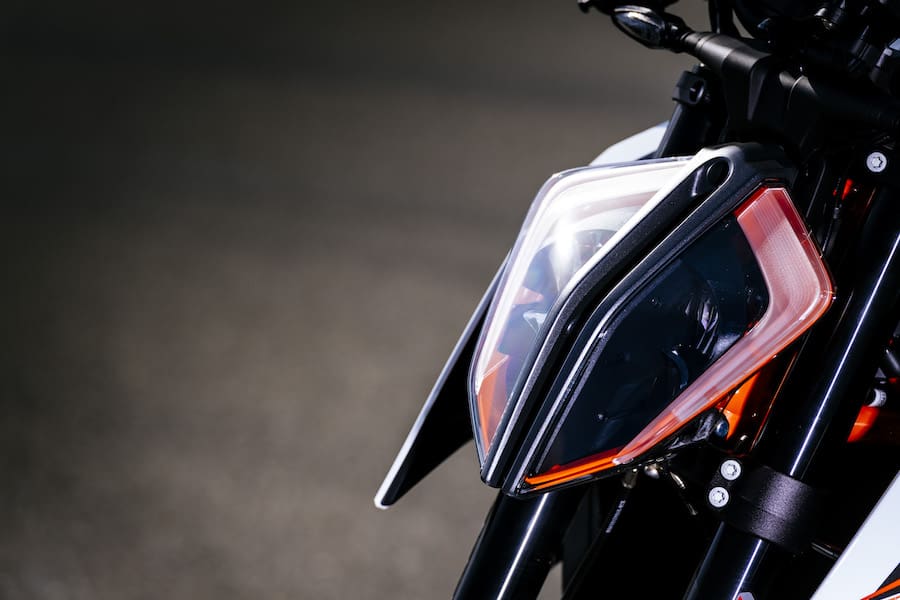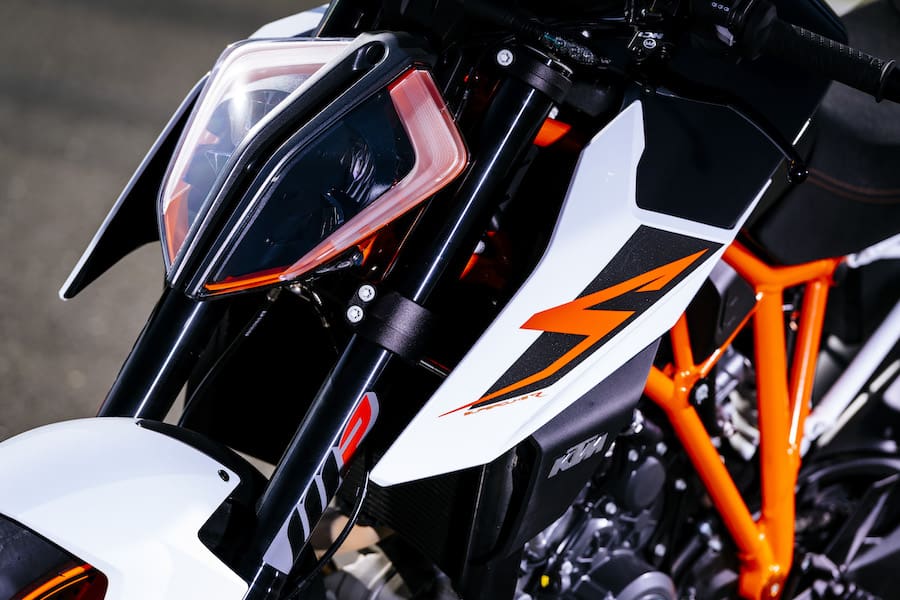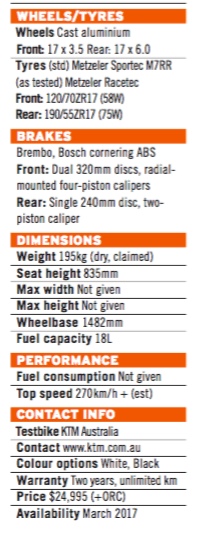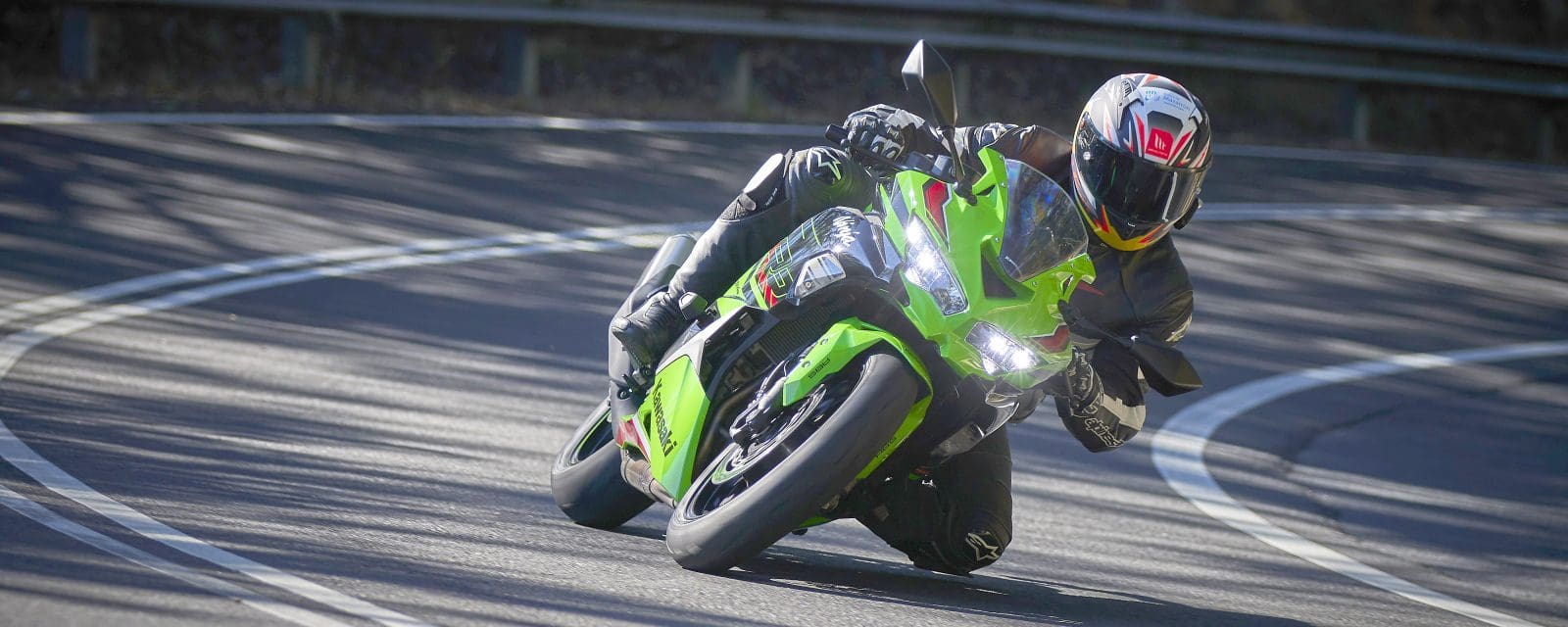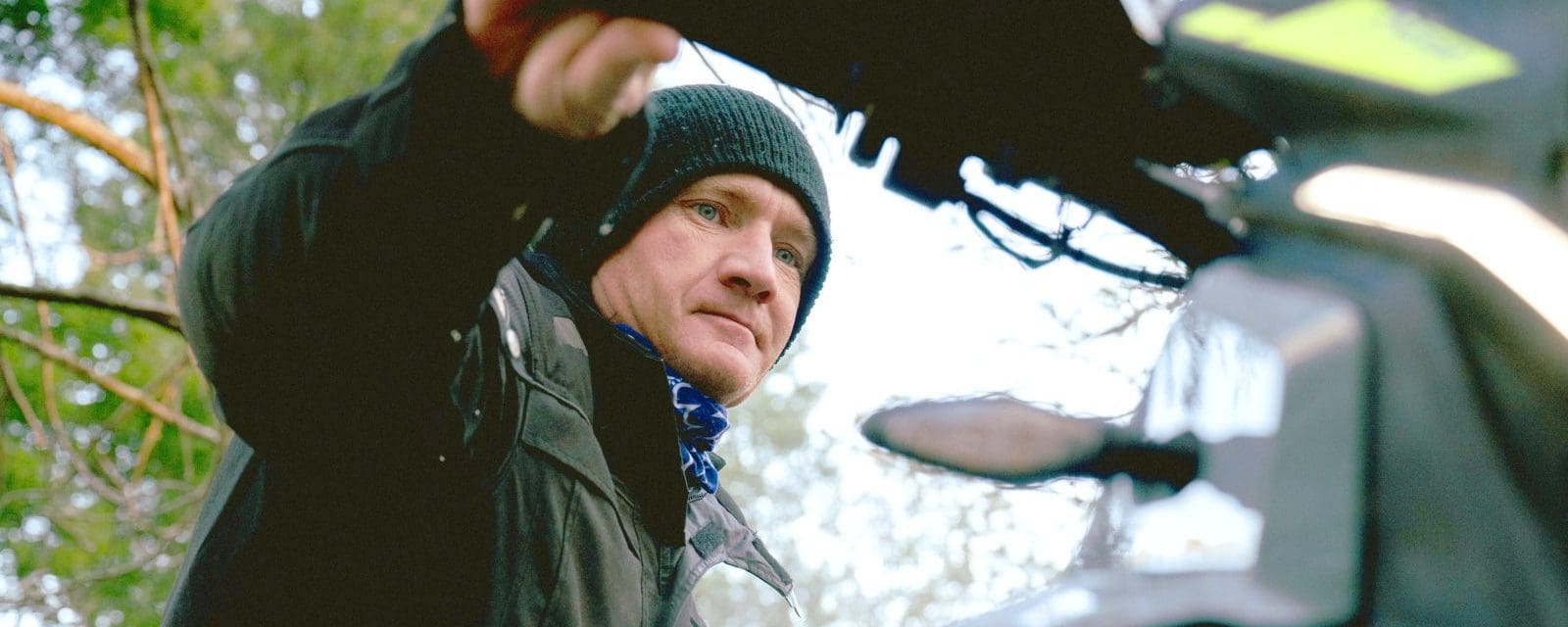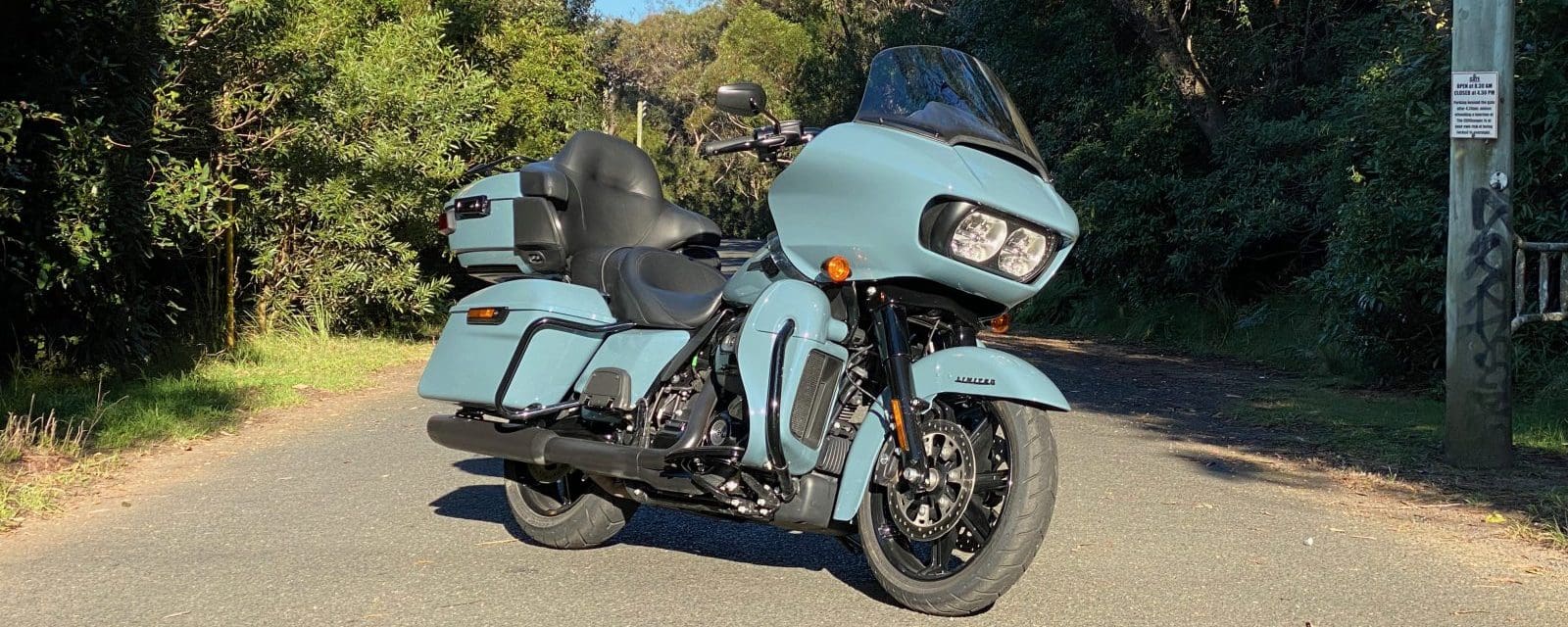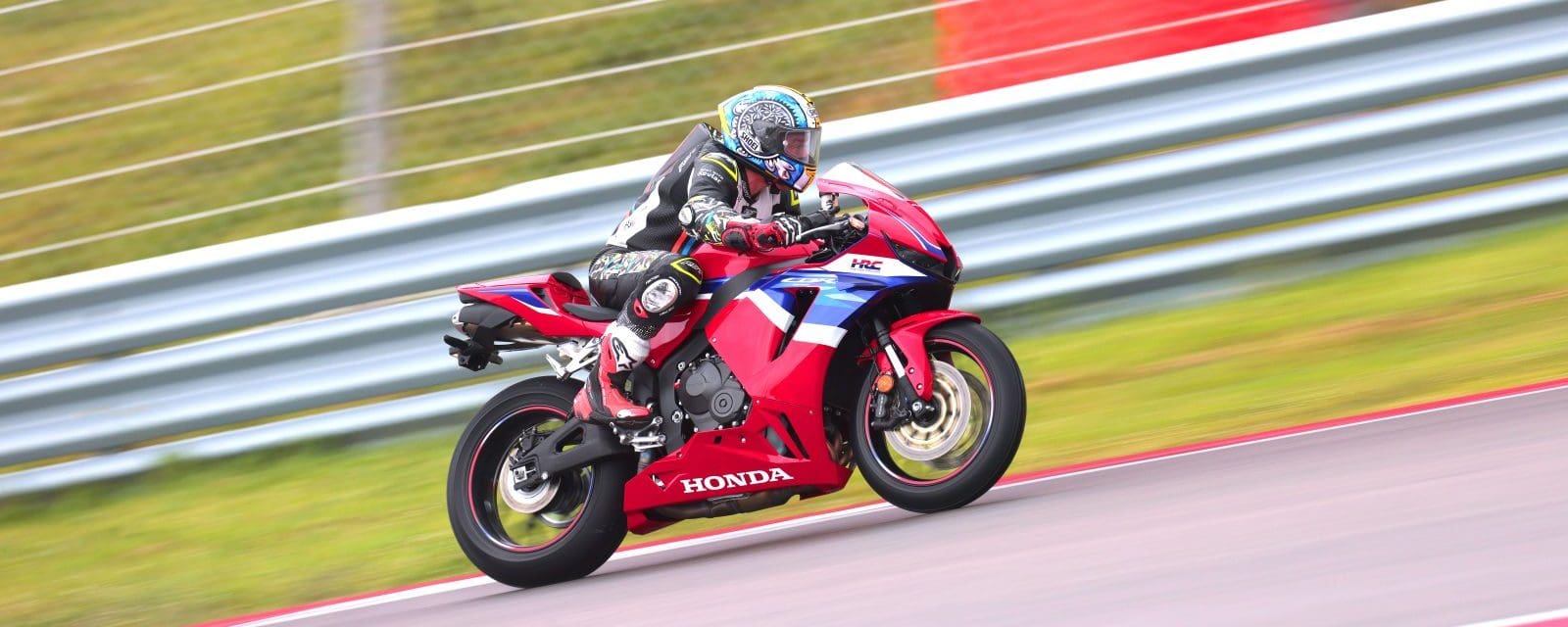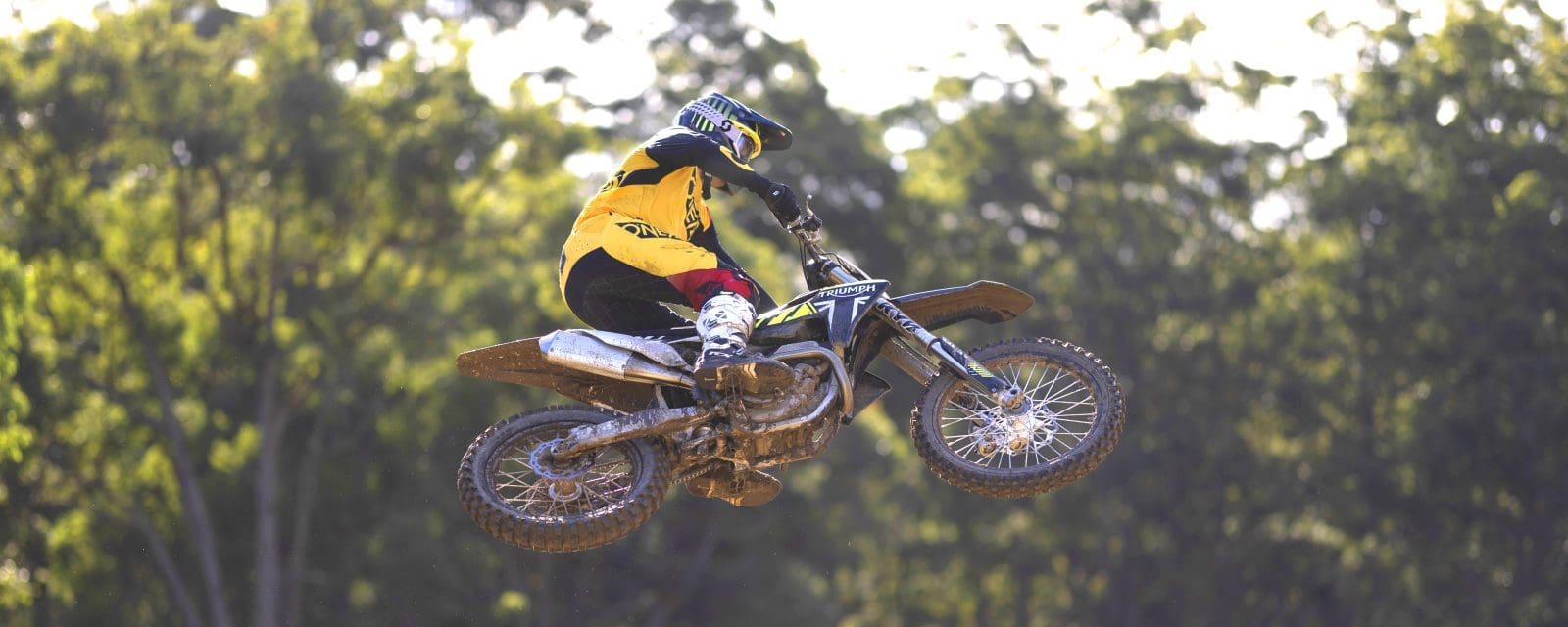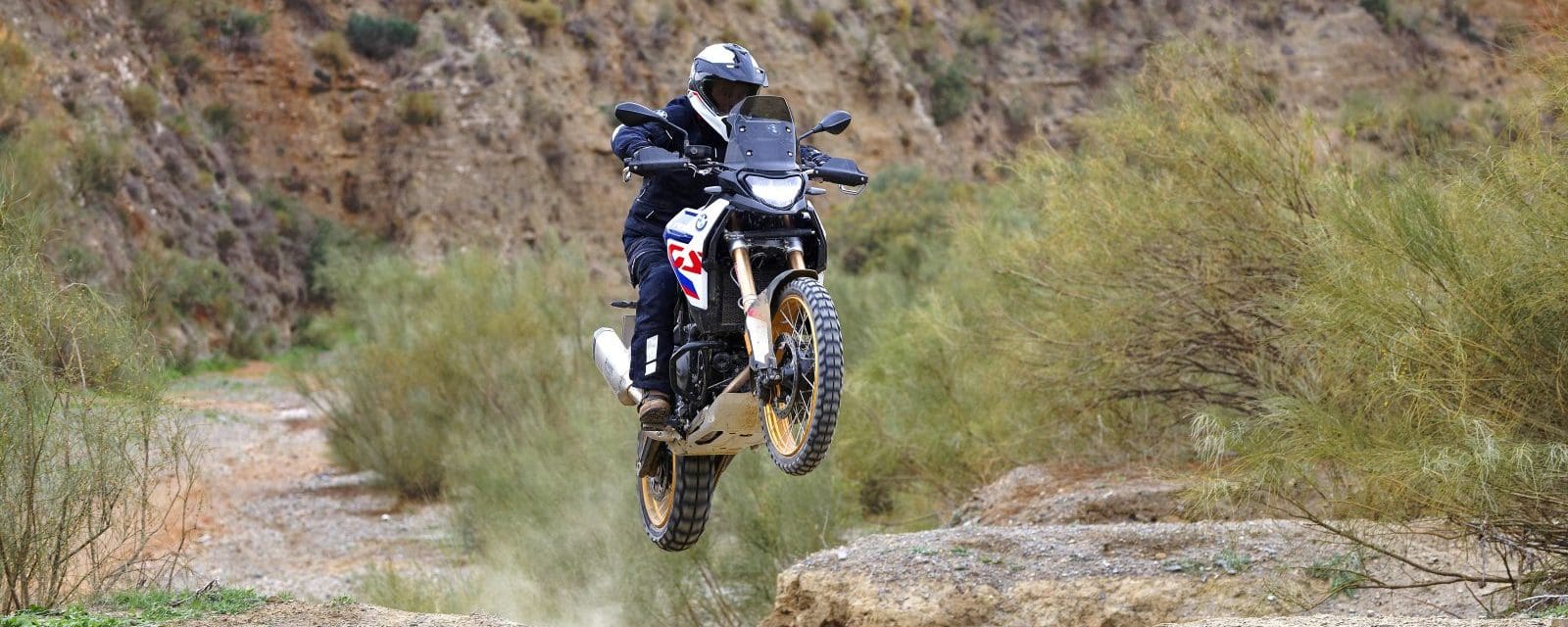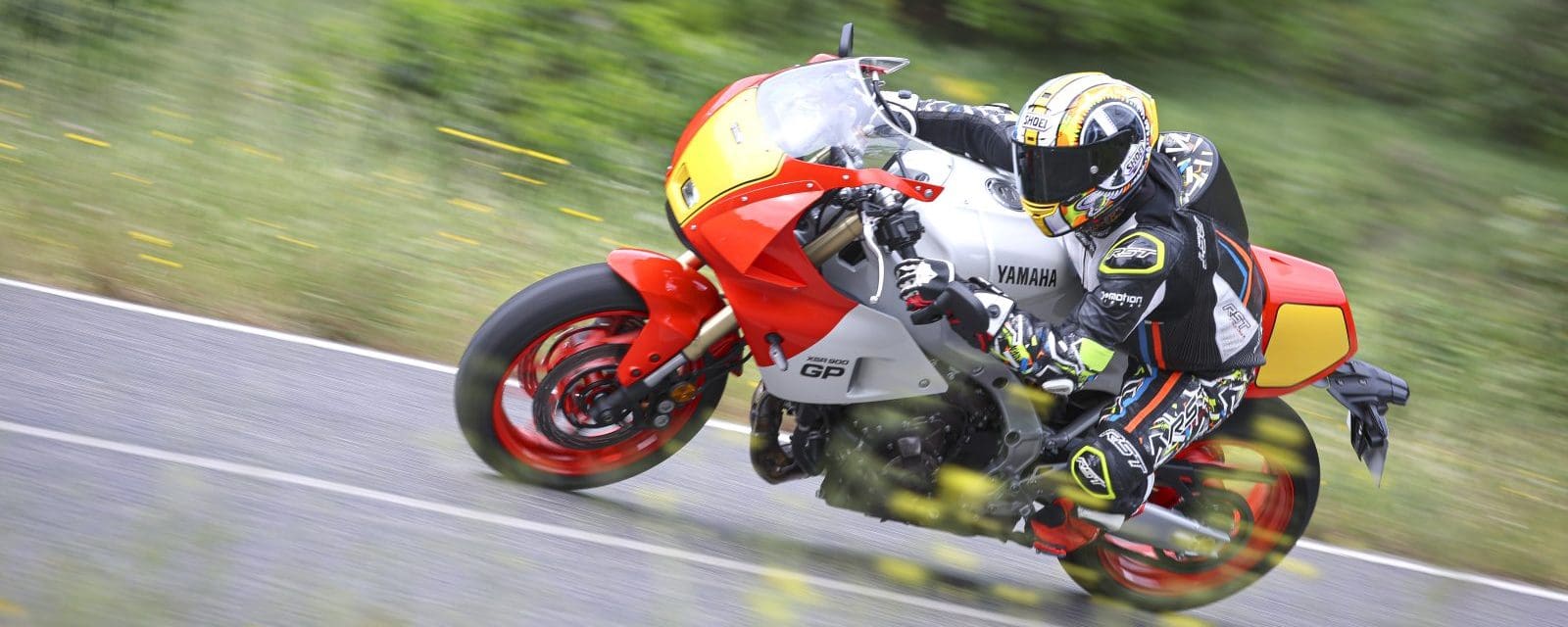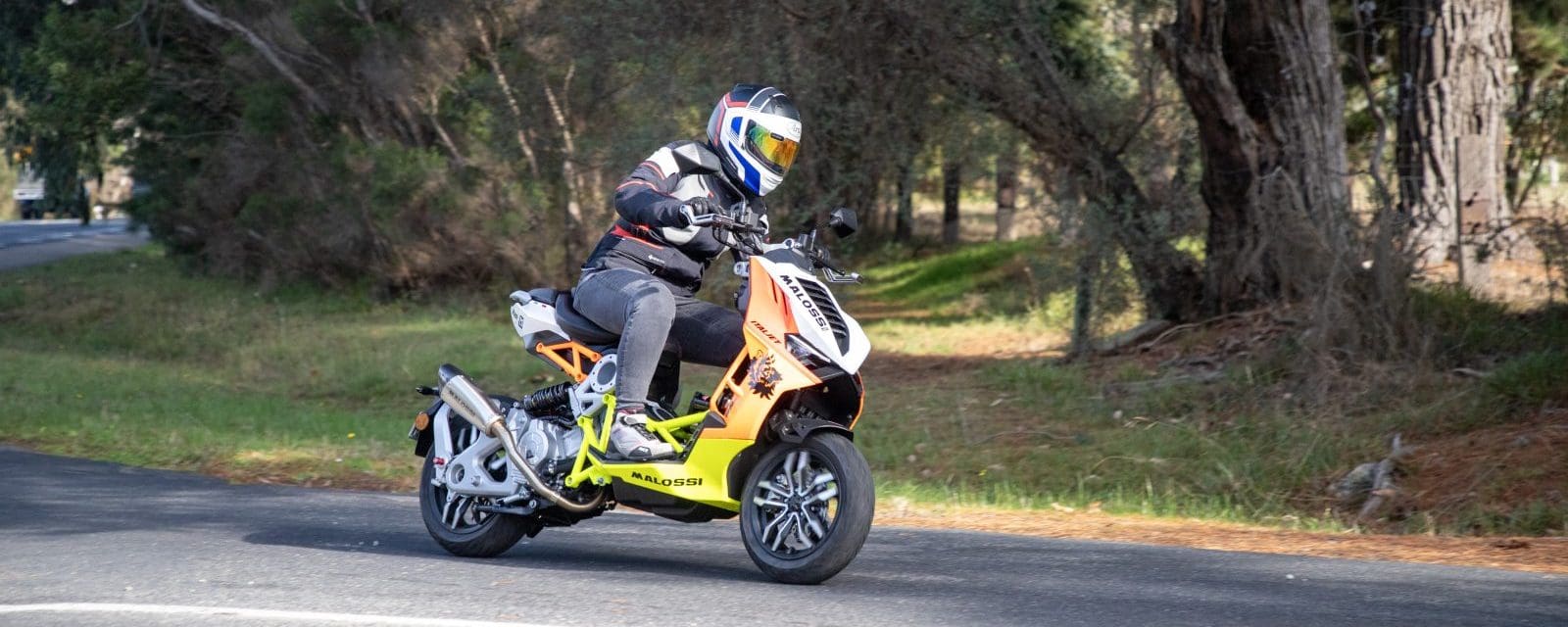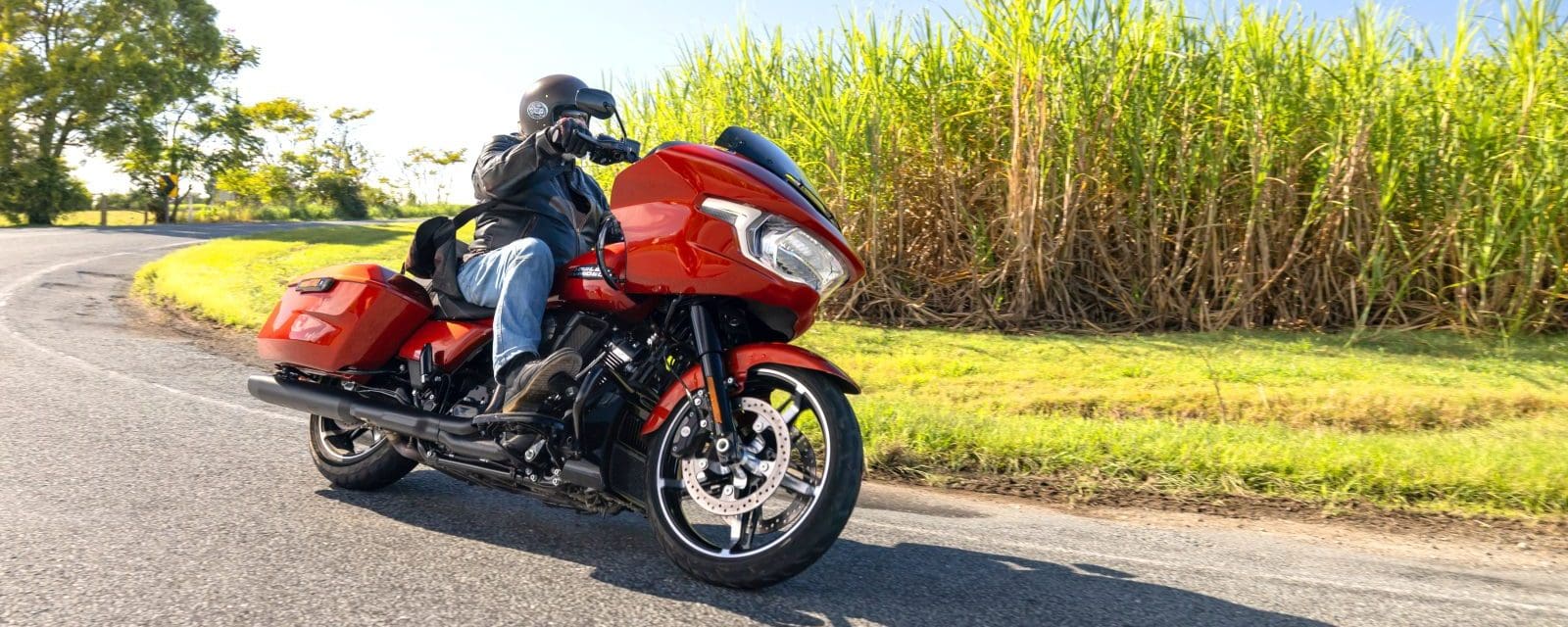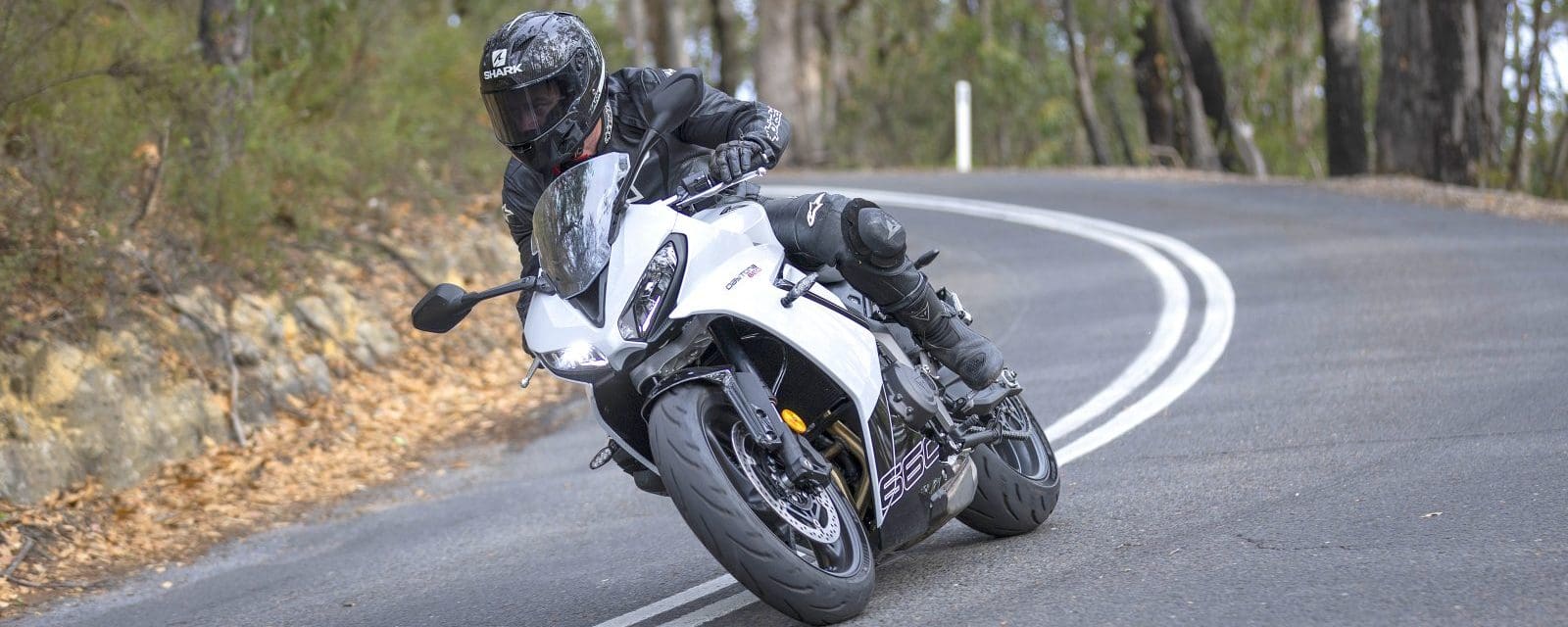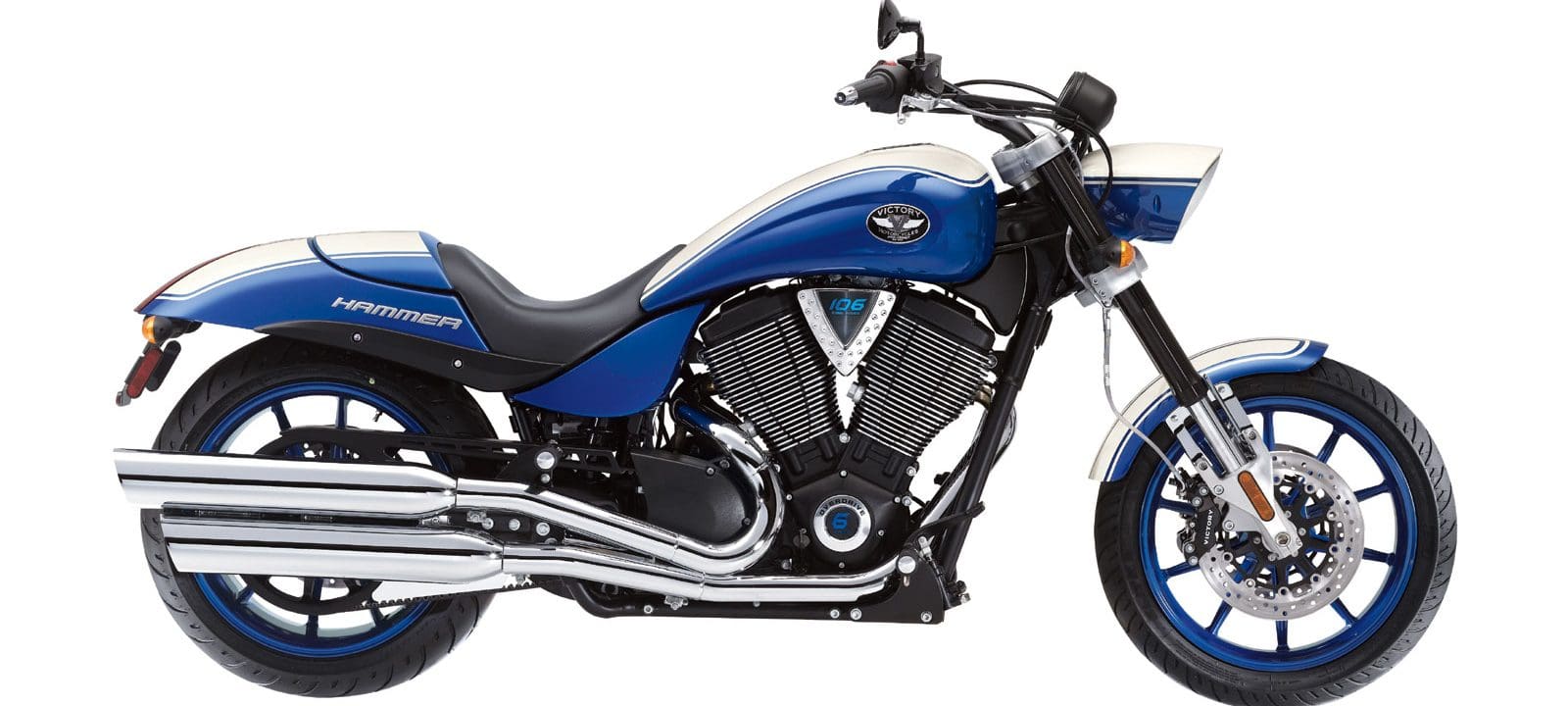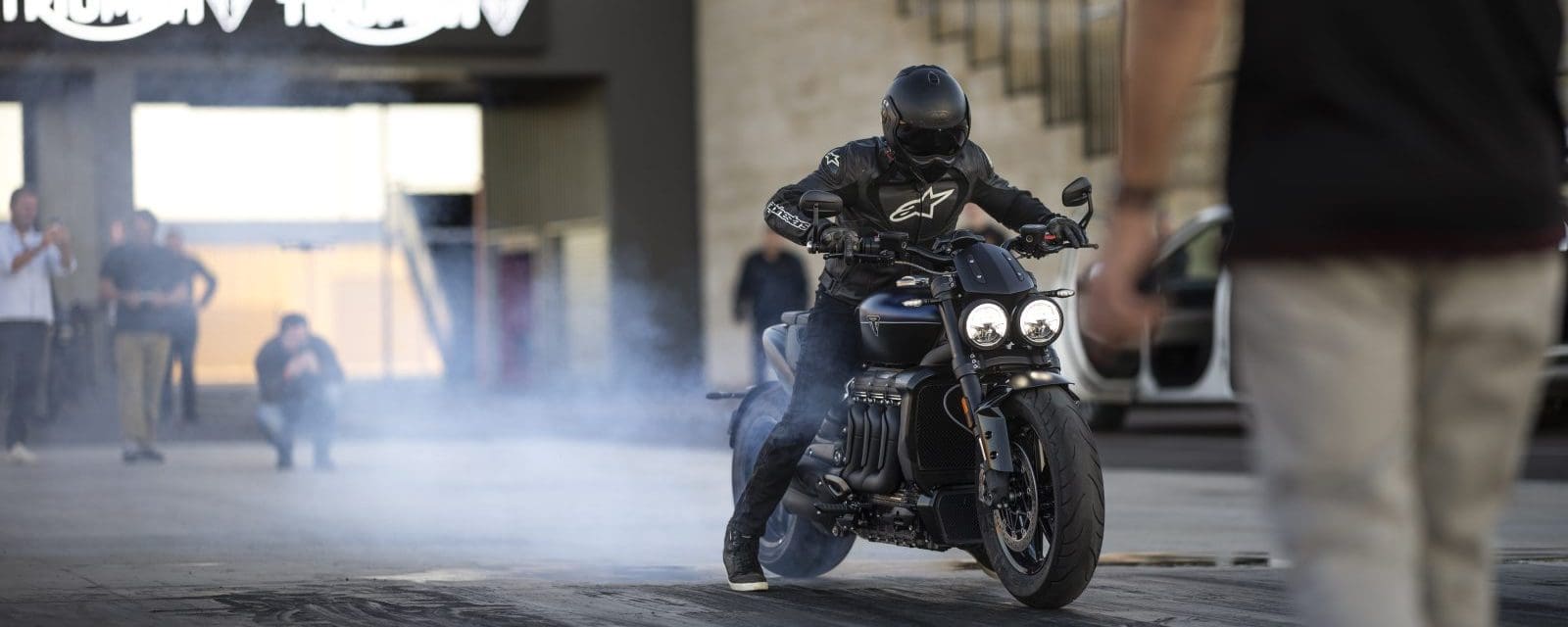Naked bikes are big business, and the biggest in the business is the 1301cc V-twin known affectionately to its creators as, the Beast. The Super Duke R has always been a barmy bike with serious performance, and has always been an acquired taste both visually and contextually. Is it a street fighter? Is it a sports bike? Is it a supermotard on steroids? Is it all of the above? For 2017, the Super Duke R has received a major redesign. The visuals, while still ostentatious, seem more traditionally attractive and less confronting. And for those still confused with the Beast’s intentions, KTM kindly help us put all of their products into context with one simple all-encompassing slogan – ‘Ready to Race’.
Flying halfway around the planet to attend the launch of Beast 2.0 at the crazy desert-marooned racing circuit of Losail, Qatar – home to the insane spectacle of MotoGP and WSBK under lights being performed in front of three Sheiks and a camel – I knew that the nutty dessert I’d be enjoying after midday mezze would be Orange nut job surprise, with extra fruit. To understand my excitement, you have to appreciate just how much fun this circuit is. It’s fast and flowing, with the dichotomy of a liberal coating of desert sand covering the fly-paper sticky surface. And did I mention it’s fast? Not just the kilometre-long straight. The series of three fast right hand turns in the second half of the circuit is one of the world’s greatest sections of truly eye-widening race track. The thought of ripping through there on the Super Duke R was enough to have me riding on a high of anticipation.
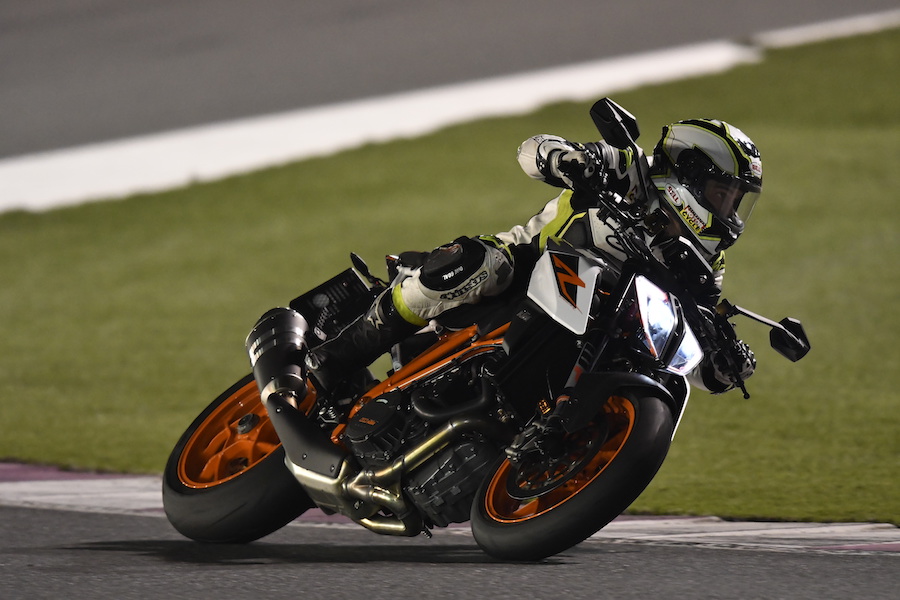
If the arrival of the surprisingly civilised Super Duke GT made you think KTM were going all soft, sensible and Honda on us, think again. Adding the GT for those who want their Beast with subdued bravado has just given Mattighofen’s masters of exuberance a licence to give the alpha-Beast bigger teeth, sharper claws and more muscle. Any fears of KTM growing up, going soft and dropping their mantra of ‘ready to race’, were soon dispelled by a quick skim of the always entertaining and slightly tongue-in-cheek KTM marketing bumph. Terms such as ‘apex hunter’, and ‘grin amplifier’, and the addition an optional ‘Track pack’ with ‘Beast mode’ all fill me with relief that this is going to be another case of KTM doing what KTM does best – feeding us nutjobs with the nourishment we need to make life worth living.
‘This is our punk album!’ proclaims yet more giggle inducing marketing gumph, and I think that’s pretty close to the truth. The Super Duke R is very much the modern day moto punk. Not pretty, but pretty vacant of any conspicuous conviviality, compromise or conformity. But never mind the marketing bollocks – what’s it really like to ride?
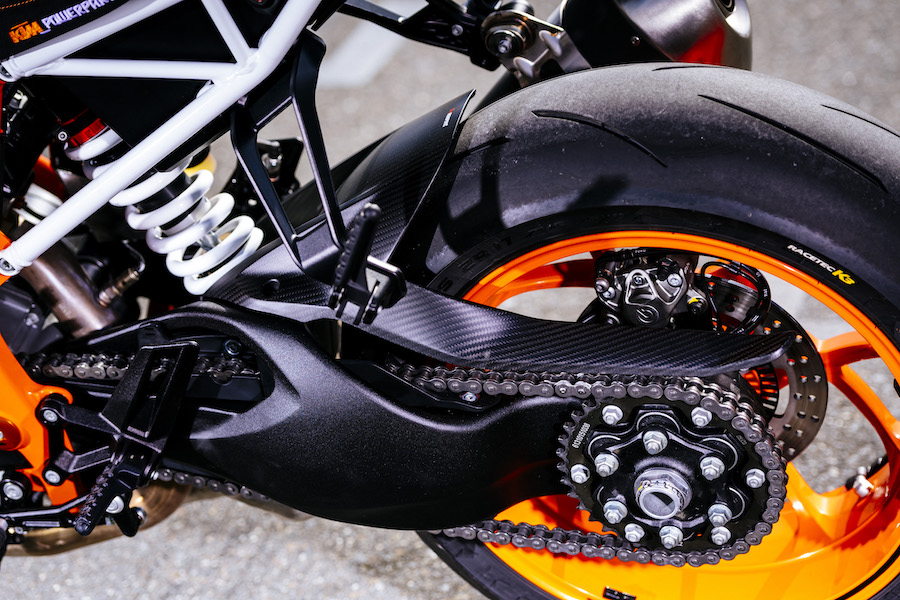
Adrenalin Express
Now that KTM have the 1290 Super Duke GT to satisfy the softies amongst us, it has opened up an opportunity to unleash the Beast’s bonkers side to an even higher level of lunacy.
All life starts with a big bang of one kind or another, and this Beast’s new lease on life starts with one almighty bang indeed. Its increased cylinder compression ratio of 13.6:1 is in the realms usually reserved for racing engines, and is only shared among the current crop of production sports bikes by Aprilia’s blindingly fast RSV4. To experience this kind of pressure first hand, you could free dive to 125 metres below sea level, play chicken with the Shanghai Maglev, slash an Airbus A380 tyre, or you could simply take a ride on a 1290 Super Duke R. I can assure you the latter is the most sensible option, but only just. KTM claim there is 130kW on tap just before the 10,500rpm limit, which translated into more meaningful mumbo jumbo means over 100Nm of fat on tap from idle to wild and more than 140 of Isaac’s finest around its grunty 7000rpm girth. Having so much torque available across the entire rev range has the effect of making an over-abundance of power quite manageable, because there’s no particular engine speed where it will suddenly come ‘on cam’ and punch you in the face. With a healthy fistful of throttle, speed builds deceptively quick due to the predictably linear power curve, and will pull smoothly from anywhere above 3000rpm. The big Duke will cruise happily at lower engine speeds, but just isn’t happy being loaded up down there.
On the subject of cruisin’, the Super Duke R joins the GT in the cruise control club for 2017, but unlike the GT has the switch in a sensible position on the left switch block in a similar configuration to the S1000 series BMWs. Hysterically, the CC only works in third to sixth gears, and only between 40 and 200km/h. Because cruising at anything over 200km/h would just be silly, right?
Mercifully for its all-important street cred, the R doesn’t get the massive f’ugly switch blocks of the GT. In fact, the rider interface on the R is a thing of minimalist beauty and functionality. From the trick-looking wafer-thin colour TFT dash, to the compact and easily navigable switch blocks, keyless ignition, and neat adjustable brake and hydraulic clutch master cylinders, all matched with the ’bars in matte black. Pure class.
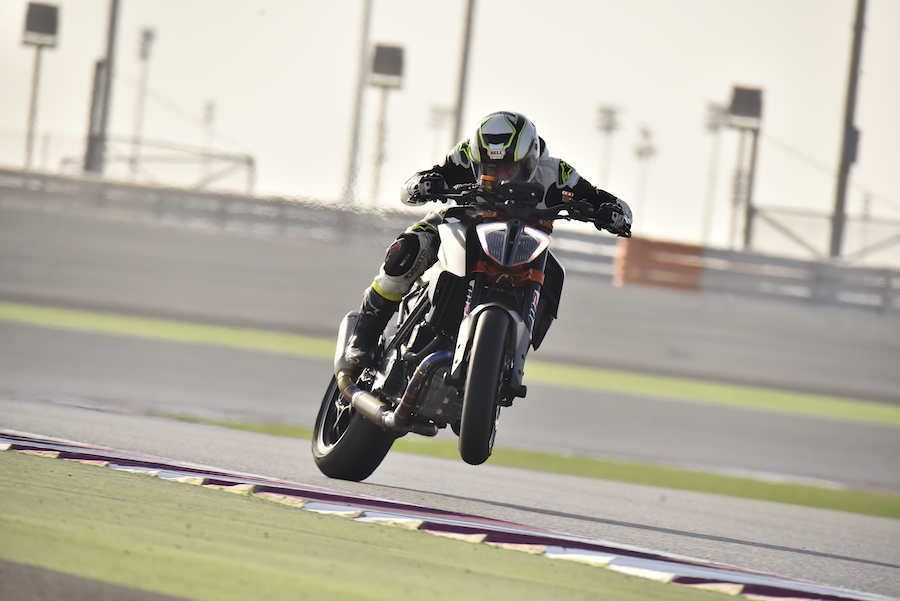
That new 20mm wider ’bar hunkers the rider down over the front of the bike, 5mm lower and 18.5mm forward compared to the 2016 Beast – it’s a positive move which has enhanced control and enabled the rider to more easily seek some semblance of shelter at extreme speeds. It has the effect of making this more powerful bike feel less wheelie-prone than the previous model, due partly to more of the rider’s weight being over the front end, and partly due to stiffer suspension transferring less weight to the rear under hard acceleration. At the indicated top speed of 265km/h on Losail’s long start/finish straight, wind blast was nowhere near as bad I had expected, and even after a full day’s riding I avoided the dreaded naked-bike neck ache.
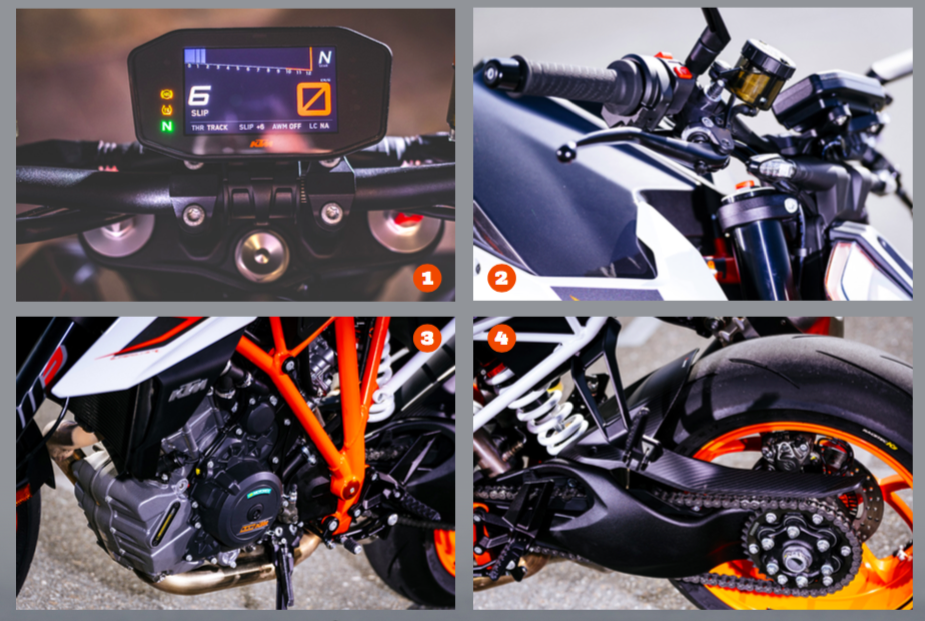
Action Packed
The standard Super Duke R is equipped with three riding modes; Sport, Street and Rain. Sport and Street both deliver full power, with a more responsive throttle progression in Sport. Rain mode delivers just 95kW of power and a correspondingly soft throttle response. All three modes have non-adjustable default traction control setting, although MTC can be disabled if desired.
All of the test bikes at the launch were fitted with both the optional ‘Performance Pack’ and ‘Track Pack’. Performance Pack adds Motor Slip Regulation (MSR) to enhance the anti-judder effect of the standard slipper clutch under deceleration, and also includes the two-way quickshifter, and ‘KTM my ride’ smartphone integration system. Each of these features are also available separately.
The Track Pack adds Track riding mode, which allows anti-wheelie to be switched off, plus a selection of three throttle-response maps, launch control, and MTC Spin Adjuster, which allows on-the-fly traction control adjustment. All these features are only available as a group.
Incidentally, I don’t agree with KTM’s assertion that traction control systems which only use throttle valve adjustment to control wheel spin, as featured on the Super Duke R, are smoother and superior to TC systems which use ignition map manipulation, or which use a combination of those methods plus injection mapping. However, I do think KTM and Bosch have produced an exceptional feel and progression by optimising the speed and response time of the Super Duke’s RBW throttle connection, making its TC system the best and smoothest of its kind.
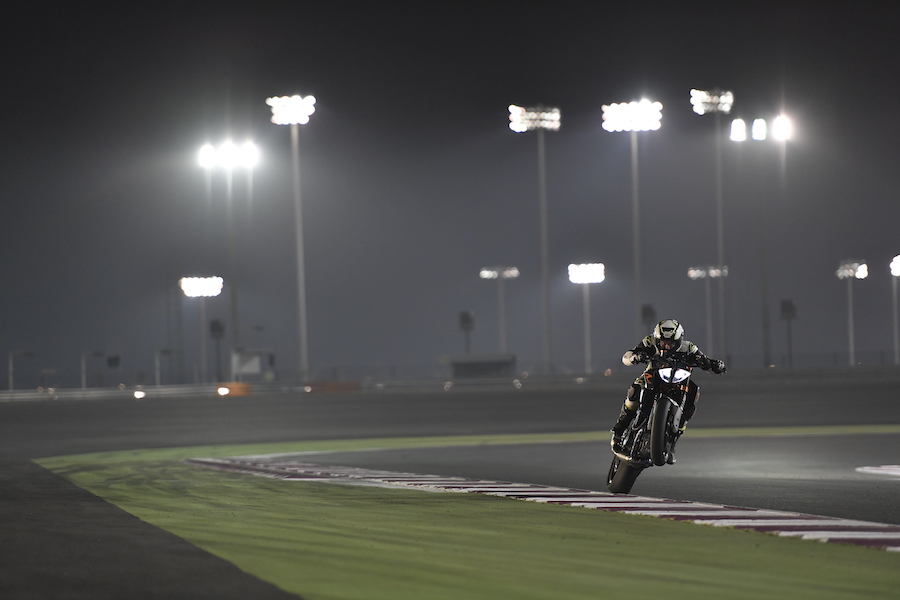
In truth, Losail International Circuit is a terrible place to test traction control anyway, because of its surface’s ridiculously high grip level. If it wasn’t for the fact that one of our Japanese journo friends crashed in the first session, I would have sworn the new Super Duke R was uncrashable. It certainly felt so, particulary when set on Street or Sport riding mode. Of course there’s no such thing as an uncrashable motorcycle, and I for one hope there never will be, but I can honestly say this is the safest I’ve ever felt lamping it up at a track launch on such a powerful bike. There were many factors in play here. The track grip was one, but the slightly over-cautious lean angle sensitive traction control, cornering ABS, and generously trail-endowed front end geometry all played a big part in the feeling of indestructibility. It’s pretty rare to go for six 30-minute track sessions on an unfamiliar bike without missing an apex, particularly when you haven’t ridden the circuit for five years and two of those sessions are at night under dazzling and disorientating floodlights.
Being slack and trail laden in comparison, the Super Duke R isn’t as sharp and agile as some of its super naked competition. Instead, its chassis’ magic numbers give the gifts of gradual grace, positive feedback and a gorilla’s grip on the road. What I mean is, even though I certainly went in too deep on numerous occasions, all I need do was crank it over a little harder, keep the faith, embrace the understeer, and ease the Beast back on the right line. And get back to the apex it would without fail. Trail braking all the way with no adverse effect on steering or loss of feel. Apex hunter indeed. And a crack shot.
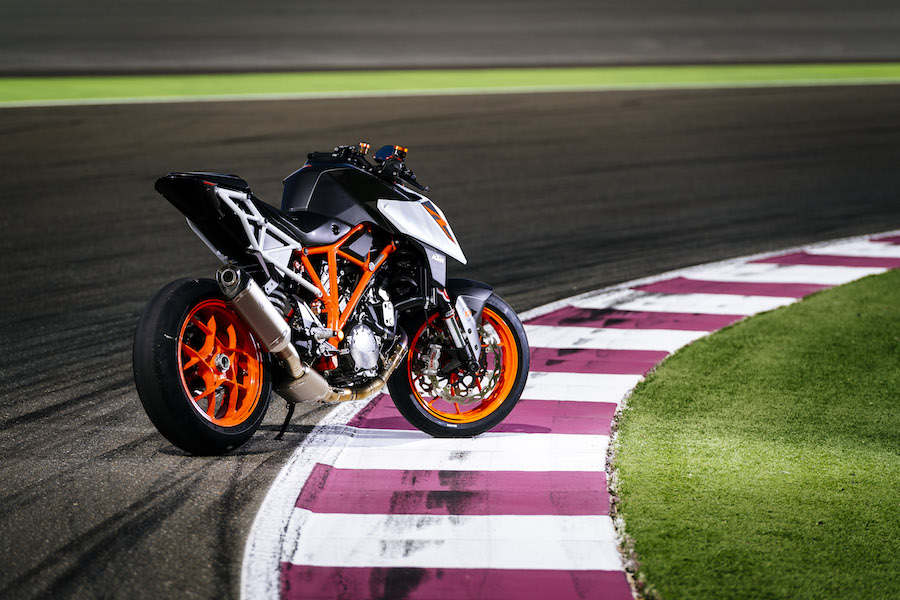
For 2017 the Super Duke R has the ‘Track pack’ option of a quickshifter for both up and down shifts. Even without the optional luxury of electronically assisted shifting, the light, direct and positive action of the LC8’s gearbox makes it one of the best around. Up shifts with the quickshifter were crisp and clean, while downshifts were also clean, so long as you didn’t throw it down a load of gears all at once. Stabbing at the lever in quick repetition doesn’t allow the system time to reset, ready for the next gear selection. It was never a problem, but some other QS systems do respond quicker on down-changes.
One of my beefs with the old Super Duke R, was that was to softly sprung and damped. This helped it relate to general real world riding, but took the edge off its potential when ridden aggressively. KTM has addressed this for 2017 with revised damping in the WP fork and shock, stiffer front springs, and more preload on the rear. It’s still not race bike firm, and gives enough compliance to see street comfort is still in the design brief, but the added support gives a more stable platform for enthusiastic use of the Super Duke’s throttle and superbike-level braking hardware.
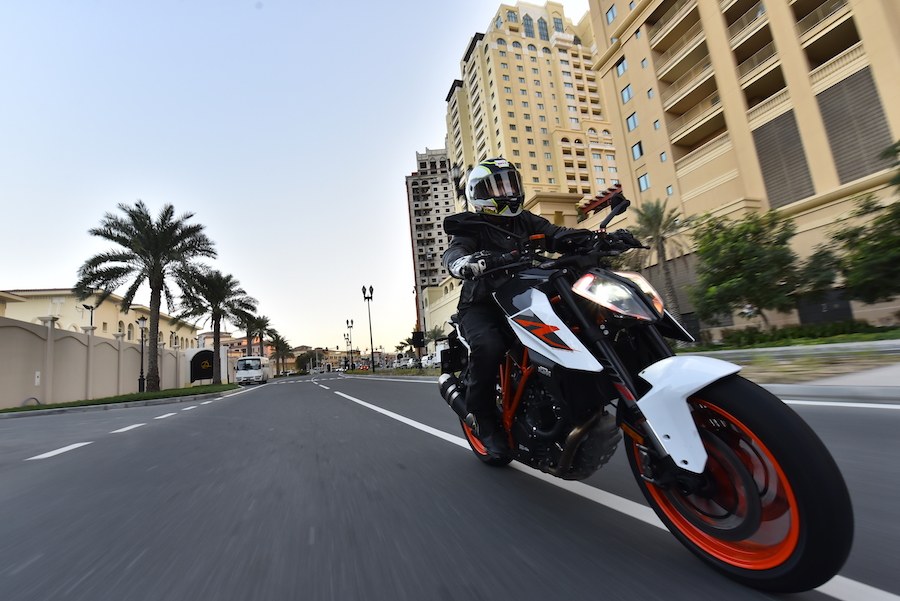
Beauty and the Beast
Central to the Beast’s new look is the face lift performed by KTM stylists Kiska. Apparently inspired by an ancient sculpture of a faceless monk, there’s certainly something sinister about the personality created by the new split LED headlight design. What’s most impressive about the 2017 Super Duke R from a design perspective, is how neat and compact everything has been kept. A lot of thought has gone into the concept of minimisation. Despite cutting an impossibly shallow profile, the new headlight unit also houses the circuit boards, heat sink for the LEDs and all the associated wiring. My favourite touch of tidiness is the front brake hoses, which have been plumbed through the bottom fork yoke at the point where the hose would normally split a separate line off to each brake caliper. With no cables thanks to the ride-by-wire throttle, all wiring and hydraulic lines tucked away tightly, and a smart phone sized dash, the Beast’s new front end look is sharp and uncluttered.
This theme of intelligently economical packaging is continued throughout the Super Duke R.
A slimmer, neater tail unit doesn’t appear to have come at the expense of rider or pillion comfort, but does give the bike a racier ranker. New side cowls silhouette the shape of the headlight unit, helping to harmonise the design in an aggressive yet elegant way. More so than any Kiska designed KTM before it, and a visual trick which seems difficult to pull off in a design exclusively using straight lines and extreme angles. This time they’ve nailed it.
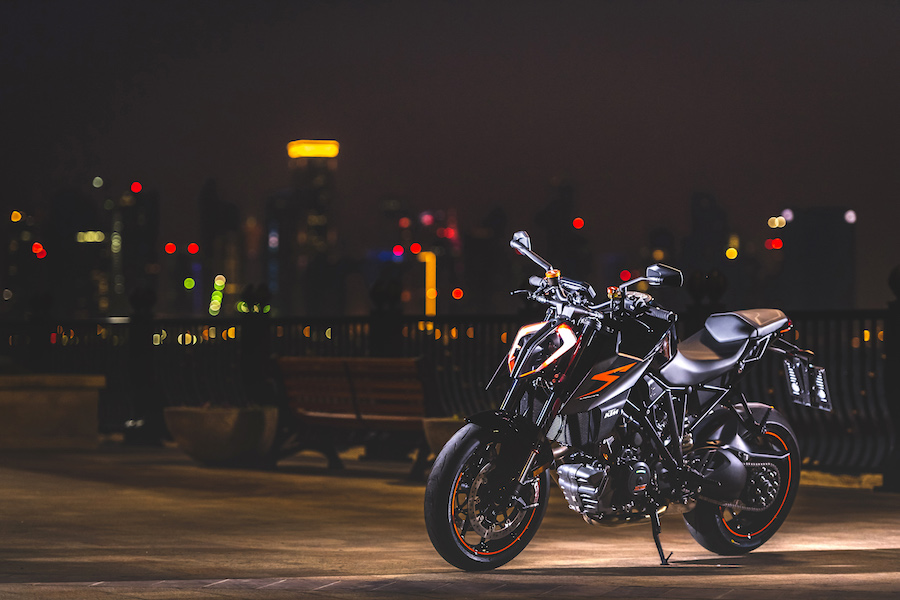
Mean and Clean
Higher revs, more power, less emissions. Seems too good to be true, but, you can even add smoother throttle response to that lot. How? Well there’s a new cylinder head design with a smaller, reshaped combustion chamber, which in conjunction with new flat bottomed intake valves raises the compression ratio to a whopping 13.6:1. Bigger bang, more go. Those intake valves are also 33 per cent lighter than the previous model’s thanks to being made from chromium nitride PVD coated titanium. Lighter intake valves can give both greater performance and lower emissions through being easier to control. Harder exhaust valve seat material and nitrified valves are said to have increased durability in that area.
Attached to each cylinder head is a resonator chamber. This is claimed to give smoother acceleration and a healthy 10 per cent lower carbon dioxide emissions up to 5000rpm.
While up at the top end of the rev range there’s an extra 500rpm of useable power thanks to 10mm shorter intake funnels.
Cleaner engines often mean bulkier exhaust designs with big fat ugly silencers. KTM have managed to avoid this by fitting a substantial pre-muffler neatly and discreetly under the front of the Super Duke’s very long swingarm. This all-new stainless steel system includes the exhaust flap and Smart Actuator System (SAC) of the Super Duke GT. This puts another useful and affective tool in the box of tricks which KTM has used to smooth out the raw brutal power of this high compression, low crank inertia LC8 lump.
Ready to Rumble
News of a possible racing category for naked bikes on the world championship stage may have come as a surprise to most, but for KTM it was just the news they had been waiting to hear for four years. That’s how long KTM Public Relations Head Thomas Kuttruf says the company has been talking to Dorna about their desire to race the kind of bikes that sell in the biggest numbers. The more you think about it, the more sense it makes. The subject of naked bike racing and the Super Duke R’s track prowess dominated its pre-launch technical briefing, which took on the atmosphere of a post-qualifying MotoGP press conference, with the underlying message being; ‘Naked bike racing? Bring it on. KTM is ready to race!’.
Joining us at Losail Circuit were KTM brand ambassadors, former grand prix racer Jeremy McWilliams, and American superbike and supermoto star Chris Filmore, both fresh from racing the new Super Duke R in a round of the Italian National Pro-Twins series at Mugello. Pitched against a field mostly made up of Ducati Panigales, McWilliams and Fillmore shared a win and a second place apiece over the two legs. KTM test rider Hannes Maier made it an all orange podium by snatching two third place finishes.
To celebrate and share their successes, KTM had three race kitted Super Duke Rs available to test at the launch, complete with a wish list of goodies from the KTM Power Parts catalogue and shod with super sticky Dunlop slicks. The rear sets, track-only exhaust system, and race tuned shock and fork cartridges took performance to another level, with lap times ranging from 2.5 to 4 seconds faster than the stock bike on Metzeler Racetec treaded rubber. Even with a bike as potent as the Super Duke R, there is huge potential for improvement. The race to the top never ever stops.
